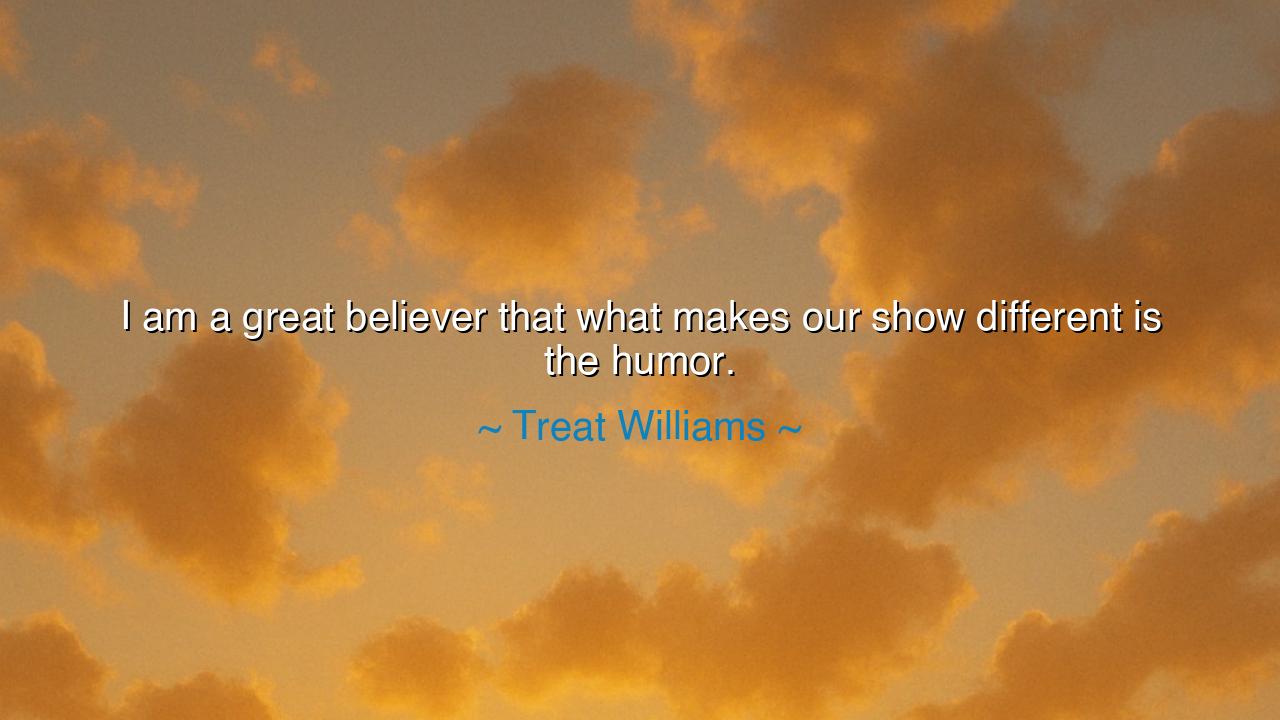
I am a great believer that what makes our show different is the






The words of Treat Williams—“I am a great believer that what makes our show different is the humor”—carry within them a quiet but noble truth, one born not merely from art, but from the ancient heartbeat of human storytelling itself. Beneath their simplicity lies a deep recognition: that humor is not a mere embellishment of life or art—it is its very breath. Williams, a man of theater and film, knew that what separates a work of performance from the ordinary is not only its tragedy, its grandeur, or its message, but its capacity to laugh, to awaken joy even in sorrow, and to reveal truth through laughter. His words are both a confession and a creed: that humor is the light that reveals the soul of all creation.
In his quote, Williams speaks not only of a television show or a stage play, but of a principle that transcends entertainment itself. He affirms that what makes any human endeavor truly different, truly memorable, is its infusion of spirit and levity. For humor is not the opposite of seriousness—it is its companion. It softens pride, it humbles greatness, it warms the coldness of intellect. The ancients knew this well: Aristophanes, in the golden age of Athens, dared to jest even about gods and statesmen, and in doing so, preserved the sanity of his people. When men become too solemn, they forget the laughter of the gods—and with it, the grace of being human.
Consider the story of Abraham Lincoln, a man burdened by the weight of a divided nation. History remembers his wisdom, his speeches, his sorrow—but his contemporaries remembered also his wit. In the darkest days of war, when despair hung like smoke over the land, Lincoln told stories that made his weary advisors smile. “If I did not laugh,” he once said, “I should die.” That is the spirit of Treat Williams’s wisdom. Humor is not an escape from truth—it is the courage to face it with light. The show Williams spoke of was made different not by spectacle or tragedy, but by this quiet resilience—the laughter that reminds us of our shared humanity.
The origin of Williams’s insight lies in the nature of his craft. Acting, at its heart, is imitation of life—and life itself is a dance between tears and laughter. A performance without humor, no matter how grand, is but half of existence portrayed. The humor he praises is not mere jest or cleverness, but the gentle light that brings warmth to drama, that makes even pain bearable. It is the laughter that does not mock but redeems, that rises from compassion rather than cruelty. In such laughter lives the deepest form of truth—the recognition that even in suffering, there is grace.
There is also an echo of ancient balance in his belief. The Greeks called it sophrosyne—the harmony between reason, passion, and humility. Humor, rightly understood, keeps the human heart from excess. It humbles the proud and lifts the fallen. It allows the actor to play the king without vanity and the fool without shame. This, perhaps, is what Williams saw: that the power of any show, of any life, lies in its ability to unite the noble and the simple, the solemn and the joyful. A story without humor may instruct, but a story with humor transforms.
Let us then take from his words a lesson for all walks of life: do not fear laughter in your work, in your art, or in your days. Let it color your seriousness, for laughter is the music of wisdom. In moments of pressure or pride, remember the strength that lies in humor—it disarms anger, it heals division, it reminds us that all men and women are equally absurd beneath the sun. To live with humor is to live with humility, and to live with humility is to touch eternity.
So let this teaching stand: Be a great believer in humor, as Treat Williams was. Whether you build, write, lead, or love, let your laughter be sincere, your joy unashamed. For humor is not the enemy of greatness—it is its guardian. Empires may fall, achievements may fade, but the sound of true laughter endures, echoing across generations like the voice of the soul remembering itself. And thus, what makes one’s life, one’s work, or one’s art different—is not its grandeur, but its heart; not its solemnity, but its humor.






AAdministratorAdministrator
Welcome, honored guests. Please leave a comment, we will respond soon